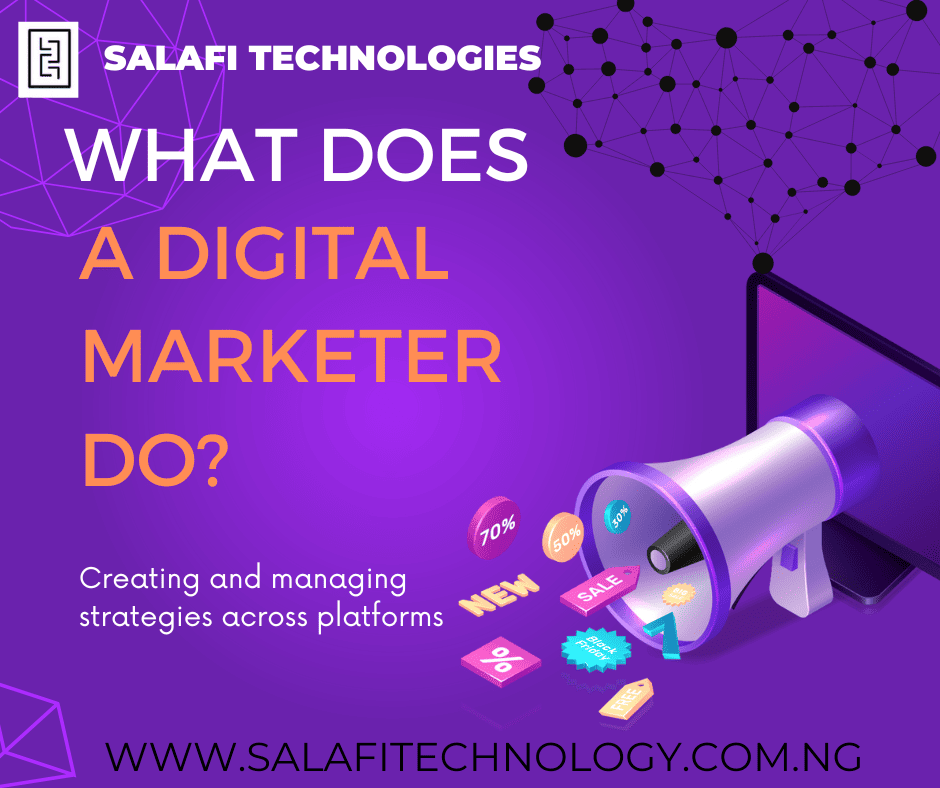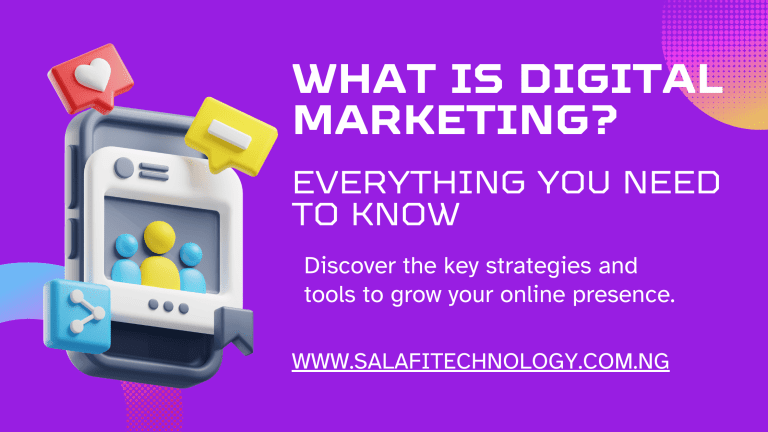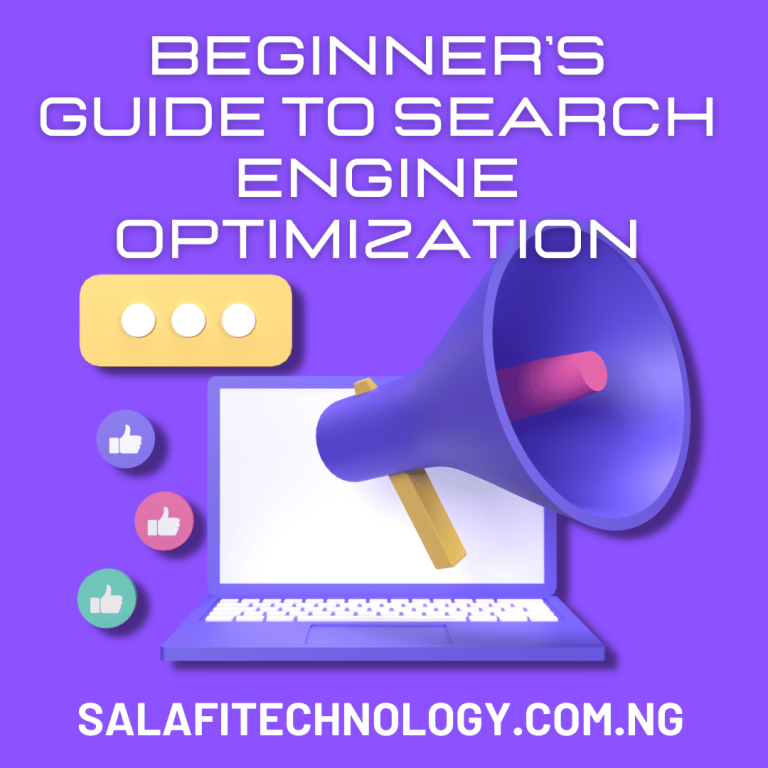What Does a Digital Marketer Do?

The question “What does a digital marketer do?” has become increasingly relevant in the fast-changing business environment. As companies shift their focus from traditional marketing to digital platforms, the role of a digital marketer has emerged as a cornerstone of successful marketing strategies. Digital marketing encompasses a wide array of activities aimed at reaching and engaging consumers through online channels, making it essential for businesses to adapt to this new era.
The growing importance of digital marketing can be attributed to several factors, including e-commerce, the increasing use of social media, and the need for data-driven decision-making. As businesses recognize the potential of digital channels to reach a broader audience and enhance customer engagement, the demand for skilled digital marketers continues to rise.
This article explores the various roles and responsibilities of digital marketers, shedding light on the skills required for success in this dynamic field. By understanding what digital marketers do, aspiring professionals can better prepare themselves for a rewarding career in digital marketing.
Overview of Digital Marketing
Digital marketing refers to the use of online channels and technologies to promote products, services, and brands. It encompasses a wide range of strategies and tactics, including search engine optimization (SEO), social media marketing, content marketing, email marketing, and pay-per-click (PPC) advertising. As businesses increasingly rely on the Internet to connect with consumers, digital marketing has become a crucial component of their overall marketing strategies.
The significance of digital marketing in the modern economy cannot be overstated. With billions of people online, digital marketing offers businesses an unprecedented opportunity to reach their target audience at scale. Unlike traditional marketing methods, which often rely on broad approaches, digital marketing allows for precise targeting and personalization, making campaigns more effective and cost-efficient.
In the context of a digital marketing job description, professionals in this field are tasked with developing, implementing, and managing marketing campaigns that promote a company’s products or services. This includes analyzing data to understand consumer behavior, optimizing marketing strategies based on performance metrics, and leveraging various digital marketing channels to achieve business objectives.
For those considering a career in digital marketing, the field offers diverse opportunities across industries, from startups to established corporations. As the demand for skilled digital marketers continues to grow, individuals with a solid understanding of digital marketing strategies and tools can look forward to a rewarding and dynamic career path.
Roles of a Digital Marketer
The field of digital marketing encompasses a variety of roles, each with its own specific focus and skill set. Understanding the roles of a digital marketer is essential for anyone considering a career in this dynamic industry. Here are some of the key positions within digital marketing:
1. SEO Specialist
An SEO (Search Engine Optimization) Specialist is responsible for optimizing a website to improve its ranking on search engines. Their primary goal is to increase organic traffic by utilizing various strategies, including keyword research, on-page optimization, technical SEO, and link building. SEO specialists analyze website performance and conduct audits to identify areas for improvement, ensuring that content is not only relevant but also easily discoverable by search engines.
2. Content Marketer
Content Marketers focus on creating valuable, relevant content that attracts and engages a target audience. This can include blog posts, articles, infographics, videos, and more. The content marketer’s role involves understanding customer pain points, developing a content strategy aligned with marketing goals, and distributing content across various platforms. They also collaborate with SEO specialists to ensure that the content is optimized for search engines.
3. Social Media Manager
The Social Media Manager is responsible for managing a brand’s presence on social media platforms. This role involves creating and curating content, engaging with followers, and analyzing social media performance. Social media managers develop campaigns that resonate with audiences, fostering community interaction and brand loyalty. They also stay updated on social media trends and algorithms to optimize content reach.
4. Email Marketer
Email Marketers specialize in creating and managing email campaigns aimed at nurturing leads and retaining customers. Their responsibilities include designing email templates, segmenting email lists, and analyzing campaign performance metrics such as open rates and click-through rates. Effective email marketing relies on understanding the target audience and crafting compelling messages that drive engagement and conversions.
5. Data Analyst
Data Analysts in digital marketing focus on interpreting data to inform marketing strategies and decision-making. They analyze website traffic, campaign performance, and customer behavior to uncover insights that can drive marketing efforts. Data analysts use various tools to track key performance indicators (KPIs) and create reports that help marketers understand the effectiveness of their strategies. Their role is crucial in optimizing campaigns and ensuring that marketing resources are allocated effectively.
In summary, each of these roles contributes to a comprehensive digital marketing strategy, highlighting the collaborative nature of the industry. As digital marketing continues to evolve, professionals in these roles must stay adaptable and continuously update their skills to meet the demands of the ever-changing digital landscape.
Responsibilities of a Digital Marketer
The responsibilities of a digital marketer are vital to the success of a brand’s online presence. As the digital landscape continues to evolve, digital marketers must adapt to various tasks that require a mix of creativity, analytical thinking, and technical skills. Here are the key responsibilities that define the role:
1. Developing Marketing Strategies
One of the primary responsibilities of a digital marketer is to develop effective marketing strategies that align with the company’s goals and objectives. This involves conducting market research to identify target audiences, understand their needs, and analyze competitors. Marketers must also consider current trends in the industry to create strategies that resonate with potential customers and differentiate the brand from its competitors.
2. Managing Campaigns Across Digital Channels
Digital marketers oversee campaigns across multiple digital channels, such as social media, email, search engines, and websites. This responsibility includes planning, executing, and optimizing campaigns to ensure they meet established goals. Marketers must coordinate efforts between different platforms, maintaining consistent messaging while tailoring content to fit the unique characteristics and audience preferences of each channel.
3. Analyzing Performance Data and Metrics
Another critical responsibility is analyzing performance data and metrics to gauge the success of marketing efforts. Digital marketers utilize tools like Google Analytics, social media insights, and email performance metrics to track key performance indicators (KPIs). By interpreting this data, they can assess the effectiveness of campaigns, identify areas for improvement, and make data-driven decisions to optimize future strategies.
4. Engaging with Audiences on Social Media
Engagement with audiences on social media is essential for building brand loyalty and fostering community. Digital marketers are responsible for creating meaningful interactions by responding to comments, messages, and reviews, as well as initiating conversations around relevant topics. This engagement not only strengthens customer relationships but also provides valuable feedback and insights into consumer preferences and behavior.
5. Creating and Distributing Content
Content creation is at the core of digital marketing. Digital marketers are tasked with producing high-quality, relevant content that attracts and retains customers. This can include blog posts, videos, infographics, and social media posts. Beyond creation, they also manage the distribution of this content through various channels to maximize reach and engagement. Collaborating with SEO specialists ensures that the content is optimized for search engines, enhancing its discoverability.
In conclusion, the responsibilities of a digital marketer encompass a wide range of activities that are essential for driving brand awareness, customer engagement, and conversions. By effectively managing these responsibilities, digital marketers play a crucial role in a brand’s online success and overall marketing strategy.
Skills Required for Digital Marketing
To thrive in the dynamic field of digital marketing, professionals must possess a diverse set of skills required for digital marketing. These skills not only enhance their ability to execute effective marketing strategies but also ensure they can adapt to the ever-evolving digital landscape. Here are the essential skills that every digital marketer should develop:
1. Analytical Skills
Digital marketing relies heavily on data analysis to measure performance and inform decisions. Marketers must be adept at interpreting data from various sources, such as Google Analytics, social media insights, and email performance metrics. Strong analytical skills enable digital marketers to identify trends, assess campaign effectiveness, and make data-driven adjustments to optimize marketing strategies.
2. Creativity
Creativity is a vital skill in digital marketing, as it drives innovative campaigns and engaging content. Marketers must think outside the box to develop unique strategies that capture the attention of their target audience. Whether it’s crafting compelling ad copy, designing eye-catching visuals, or brainstorming fresh content ideas, creativity plays a crucial role in differentiating a brand in a competitive market.
3. Technical Proficiency
With the increasing reliance on technology in marketing, digital marketers must be technically proficient. This includes familiarity with various digital marketing tools and platforms, such as content management systems (CMS), customer relationship management (CRM) software, and social media management tools. Understanding basic HTML, SEO principles, and data tracking technologies can also be beneficial for implementing and optimizing campaigns.
4. Communication and Interpersonal Skills
Effective communication is essential for digital marketers, as they must convey ideas clearly to team members, clients, and audiences. This includes writing compelling content, crafting persuasive marketing messages, and engaging with customers through social media and email. Strong interpersonal skills foster collaboration and help marketers build relationships with stakeholders, influencers, and customers, enhancing overall marketing efforts.
5. Adaptability to Trends
The digital marketing landscape is constantly changing, with new trends, technologies, and consumer behaviors emerging regularly. Successful digital marketers must be adaptable and open to learning. Staying updated on the latest trends in digital marketing, such as changes in social media algorithms, emerging platforms, and evolving consumer preferences, is crucial for maintaining a competitive edge and ensuring strategies remain relevant.
In summary, the skills required for digital marketing encompass a blend of analytical, creative, technical, communication, and adaptability skills. By honing these abilities, digital marketers can effectively navigate the challenges of the industry and drive successful marketing campaigns that resonate with their target audience.
Digital Marketing Strategies and Channels
In the world of digital marketing, understanding the various digital marketing strategies and digital marketing channels is essential for driving brand awareness, engagement, and conversions. Here’s an overview of key strategies and channels that digital marketers utilize to reach their audiences effectively:
1. Content Marketing
Content marketing is a strategic approach focused on creating and distributing valuable, relevant content to attract and engage a target audience. This includes blog posts, articles, videos, infographics, podcasts, and more. By providing useful information and solving problems for potential customers, brands can establish themselves as industry leaders, foster trust, and drive organic traffic to their websites. Effective content marketing not only enhances brand awareness but also plays a crucial role in search engine optimization (SEO).
2. SEO and SEM Tasks
Search Engine Optimization (SEO) and Search Engine Marketing (SEM) are critical components of digital marketing that focus on improving a brand’s visibility in search engine results.
- SEO involves optimizing website content, structure, and technical aspects to rank higher in organic search results. This includes keyword research, on-page optimization, link building, and improving site speed and user experience.
- SEM, on the other hand, involves paid advertising strategies, such as Pay-Per-Click (PPC) campaigns. This allows marketers to bid on keywords and display ads at the top of search engine results pages (SERPs), driving targeted traffic to their websites.
Together, SEO and SEM tasks enable brands to maximize their online presence and reach potential customers effectively.
3. Social Media Marketing
Social media marketing involves promoting products, services, or content on social media platforms like Facebook, Instagram, Twitter, LinkedIn, and TikTok. This strategy allows brands to connect with their audience in a more personal and engaging way. Through organic posts, paid ads, and influencer partnerships, businesses can build brand awareness, foster community engagement, and drive traffic to their websites. Social media marketing also enables real-time interaction, providing valuable insights into customer preferences and behaviors.
4. Email Marketing
Email marketing remains one of the most effective digital marketing channels for nurturing leads and retaining customers. This strategy involves sending targeted emails to segmented lists of subscribers and delivering personalized content, promotions, and updates. Email marketing helps maintain customer relationships, encourage repeat business, and drive conversions. Key components include creating engaging subject lines, optimizing content for mobile devices, and utilizing analytics to track open rates, click-through rates, and conversions.
5. Affiliate Marketing
Affiliate marketing is a performance-based marketing strategy where businesses reward affiliates (partners) for driving traffic or sales through their marketing efforts. Affiliates promote products or services using unique referral links, earning a commission for each sale or lead generated. This channel allows brands to expand their reach by leveraging the influence of affiliates and influencers, often at a lower cost than traditional advertising methods. It’s an effective way to tap into new audiences while minimizing risk.
By utilizing a combination of these digital marketing strategies and digital marketing channels, businesses can effectively reach and engage their target audience. Each strategy offers unique advantages and can be tailored to align with specific marketing goals, ensuring a well-rounded and impactful digital marketing approach. Understanding and mastering these channels is essential for any digital marketer aiming to succeed in the competitive online landscape.
Tools Used by Digital Marketers
In the fast-paced world of digital marketing, leveraging the right digital marketing tools can significantly enhance efficiency, effectiveness, and the ability to analyze performance. Let’s take a look at some of the commonly used tools and software that digital marketers utilize across various functions:
1. Analytics Tools
Analytics tools are essential for measuring and analyzing the performance of digital marketing campaigns. These tools help marketers understand user behavior, track website traffic, and make data-driven decisions.
- Google Analytics: This powerful tool provides insights into website traffic, user engagement, conversion rates, and much more. Marketers can track various metrics, such as page views, bounce rates, and demographic information, allowing for a deep understanding of audience behavior. Google Analytics also supports goal tracking and e-commerce analytics, making it indispensable for optimizing marketing strategies.
- SEMrush: SEMrush is a comprehensive SEO tool that offers a suite of features, including keyword research, site audits, and competitor analysis. Marketers can track their search engine rankings, analyze backlinks, and uncover opportunities for improving SEO efforts. Additionally, SEMrush provides insights into paid search campaigns, making it valuable for both SEO and SEM tasks.
2. Social Media Management Tools
Managing multiple social media platforms can be time-consuming, but social media management tools simplify the process by allowing marketers to schedule posts, monitor engagement, and analyze performance from a single dashboard.
- Hootsuite: Hootsuite is a popular social media management platform that enables users to schedule and publish posts across various social media channels. It also offers analytics to measure engagement, reach, and overall performance. Marketers can monitor brand mentions, respond to comments, and engage with their audience directly within the platform, streamlining social media management.
- Buffer: Similar to Hootsuite, Buffer helps marketers plan and schedule social media posts. It provides insights into post-performance and audience engagement, making it easier to refine social media strategies. Buffer’s user-friendly interface allows marketers to manage multiple accounts and collaborate with team members seamlessly.
3. Email Marketing Tools
Email marketing remains a crucial channel for engaging customers and nurturing leads. Email marketing tools help streamline the process of creating, sending, and analyzing email campaigns.
- Mailchimp: Mailchimp is one of the most popular email marketing platforms known for its user-friendly interface and robust features. It allows marketers to create visually appealing email campaigns, segment their audience, and automate email sequences. Mailchimp also provides analytics to track open rates, click-through rates, and overall campaign performance, enabling marketers to optimize their email strategies effectively.
- Constant Contact: Constant Contact is another widely used email marketing tool that offers a range of features, including customizable templates, list segmentation, and automation capabilities. Marketers can easily create and send newsletters, promotional emails, and event invitations while tracking performance metrics to assess the effectiveness of their campaigns.
By utilizing these digital marketing tools, marketers can enhance their productivity, gain valuable insights, and create more effective marketing campaigns. From analytics and social media management to email marketing, the right tools are essential for navigating the complexities of digital marketing and driving successful outcomes. Investing in these resources allows digital marketers to focus on strategy and creativity while ensuring data-driven decision-making.
A Day in the Life of a Digital Marketer
Morning Routine
8:30 AM: Check Emails and Updates
A digital marketer’s day often starts by checking emails and messages. This initial task allows marketers to catch up on communications from clients, team members, and stakeholders. Responding to urgent inquiries or requests can set the tone for the day.
9:00 AM: Daily Stand-up Meeting
Many digital marketing teams begin their day with a brief stand-up meeting to discuss ongoing projects, upcoming campaigns, and immediate priorities. This collaborative environment fosters open communication, allowing team members to share updates and identify any roadblocks that need addressing.
Mid-Morning Tasks
9:30 AM: Content Creation and Review
After the stand-up, digital marketers may spend time creating or reviewing content. This could involve drafting blog posts, designing social media graphics, or developing email marketing campaigns. Collaboration with content writers, designers, and other team members ensures that the messaging aligns with brand guidelines and marketing strategies.
11:00 AM: Social Media Management
During this time, a digital marketer might schedule posts for various social media platforms using management tools like Hootsuite or Buffer. They analyze past performance data to determine the best times to post and the types of content that resonate with their audience. Engaging with followers by responding to comments and messages also falls within this timeframe.
Afternoon Activities
Noon – Lunch Break
Taking a break is essential for maintaining productivity. Many digital marketers use this time to recharge, network with colleagues, or explore industry news and trends.
1:00 PM: Campaign Planning and Strategy Development
In the afternoon, a digital marketer may focus on planning upcoming campaigns. This involves researching digital marketing trends, setting goals, and selecting appropriate channels and strategies. Meetings with the marketing team or cross-departmental collaborations may take place to brainstorm ideas and ensure alignment with overall business objectives.
3:00 PM: Data Analysis and Reporting
Understanding campaign performance is critical in digital marketing. During this time, a digital marketer reviews analytics from various channels—such as website traffic, social media engagement, and email performance. Tools like Google Analytics and SEMrush help them assess key metrics and make data-driven decisions for optimizing future strategies.
Late Afternoon Wrap-Up
4:00 PM: Team Collaboration and Feedback Sessions
As the day winds down, digital marketers often engage in feedback sessions with their teams. This may involve presenting findings from data analysis, discussing the effectiveness of current campaigns, and gathering insights for improvement. Collaborating with other departments, such as sales and product teams, is also common to ensure cohesive marketing efforts.
5:00 PM: Planning for Tomorrow
Before wrapping up for the day, digital marketers typically review their to-do lists and set priorities for the next day. This might involve outlining tasks, scheduling meetings, and preparing for upcoming campaigns.
The day in the life of a digital marketer is marked by a variety of tasks, from content creation and social media management to data analysis and strategic planning. The role requires adaptability and collaboration, as marketers constantly adjust their strategies based on performance metrics and industry trends. This dynamic environment keeps digital marketers engaged and ensures that no two days are the same, making it a rewarding career choice in today’s digital landscape.
Conclusion
In summary, understanding the responsibilities of a digital marketer highlights the diverse and ever-changing nature of this role. Digital marketers play a vital part in driving business success through various responsibilities, including developing marketing strategies, managing campaigns, and analyzing performance data. They work across multiple channels, such as SEO, social media, content marketing, and email marketing, utilizing a wide range of skills and tools to engage audiences effectively.
The versatility of digital marketing roles extends across various industries, making it a highly sought-after career path. With the growing importance of online presence in today’s business landscape, professionals skilled in digital marketing are essential for organizations aiming to thrive in the digital economy.
Whether you’re considering a career in digital marketing or looking to enhance your skills, the opportunities in this field are abundant. Embracing the diverse roles and responsibilities of digital marketers can lead to a fulfilling career filled with continuous learning and growth. Explore this exciting path and become part of the evolving world of digital marketing!




One Comment